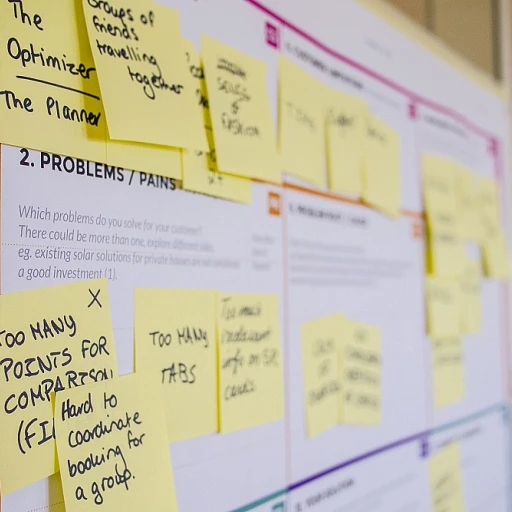
AI and the future of SEO: setting the stage
The synergy of AI and SEO
The advent of AI has brought with it an unprecedented shift in the way SEO operates. With a data-backed approach, artificial intelligence is currently transforming search engine optimization from guesswork into a precise science. According to a report on the role of AI in SEO, predictive analytics can offer significant improvements in understanding consumer behavior and optimizing various aspects of SEO strategy.
Revolutionizing keyword optimization
Tools powered by AI, such as Semrush and Google Analytics, are refining the keyword selection process. They help uncover search intent and preferences with such accuracy that content creators can tailor their offerings to match the exact needs of their audiences. By tapping into the power of AI, marketers can achieve a balance between relevance and search volume, courting both the search engines and the searchers themselves.
Enhancing content relevancy
The integration of AI in SEO goes beyond keywords – it stretches to the very fabric of content creation. AI can evaluate the effectiveness of content in terms of SEO, enabling creators to produce material that resonates with both search engines and human readers. Optimization now involves not just sprinkling keywords but ensuring the content as a whole addresses the nuances of user queries.
AI SEO in action
Case studies across various industries have shown that incorporating AI in SEO efforts can lead to marked improvements in search engine rankings. For instance, content enhanced by AI tools such as natural language processing algorithms often sees a higher engagement rate from the target audience. This higher engagement, in turn, signals to Google and other search engines that the content is valuable, thereby boosting its ranking.
AI's role in user experience
Personalization is a critical aspect where AI can remarkably fine-tune user experience. AI algorithms can analyze user data and behavior to deliver personalized content recommendations and search results. Such customization not only serves the user more effectively but also fosters a loyal relationship between the brand and its customers.
Understanding natural language processing in AI SEO
Decoding the Role of NLP in Search Engine Optimization
Modern SEO is no longer just about hitting the right keywords. With the advent of artificial intelligence, natural language processing (NLP) has become a cornerstone for understanding user intent and improving content relevance. A prime example of NLP in action is Google's BERT algorithm, which can comprehend the nuances of human language to return more accurate search results.
Statistics show an increasing trend in the use of NLP for SEO. According to a study by McKinsey & Company, companies adopting AI-based technologies like NLP can expect to see a substantial impact on their business models, with NLP improving customer experience by up to 30%.
SEO tools have started to embed NLP capabilities to provide deeper insights into keyword context. Tools like SEMrush and Moz Pro leverage NLP to analyze the sentiment behind search queries, which can inform content strategies that resonate with audiences on an emotional level.
Adobe Analytics' use of NLP exemplifies how large datasets can be synthesized into actionable insights for personalized content creation. Their systems process data at scale to determine content themes that align with user interests, a process once thought to be solely within the human purview.
Case studies, such as Thomson Reuters' use of AI in its content strategy, showcase the practical applications of NLP in SEO. Their approach involves using AI to parse legal documents and news articles to surface trending topics and keywords that inform their SEO strategy.
However, the integration of NLP in SEO is not without its controversies. Experts like Dr. Pete Meyers from Moz argue that while NLP has enhanced the search experience, it also presents challenges in terms of ranking volatility as search engines constantly evolve to understand language more deeply. This sentiment is echoed across various reports suggesting that the AI-SEO landscape is rapidly changing, and businesses need to stay agile.
Understanding the subtleties of natural language enables more than just keyword optimization; it forms the basis for creating richer, more engaging content. By analyzing patterns within large volumes of search data, AI SEO tools can tailor content to the latent needs and desires of users.
When discussing the added value of NLP, expert opinions converge on its ability to decipher user intent. This capability ensures that content not only includes relevant keywords but is structured in a way that mirrors how people actually speak and inquire about topics. Consequently, sites that optimize content for NLU (Natural Language Understanding) tend to perform better in search engine rankings.
As we delve deeper into AI-driven SEO tactics, it's evident that leveraging NLP is more than a fleeting trend—it's integral to the future of content strategy. For further insights into how AI is reshaping SEO, one might explore the evolutionary nexus of predictive analytics in this realm, as detailed here.
Predictive analytics: the crystal ball of SEO content creation
Predictive analytics: from data to SEO foresight
As we immerse deeper into the age of AI in search engine optimization, predictive analytics emerges as a game changer. This branch of analytics is all about interpreting big data to forecast future trends and user behaviors. By analyzing historical and real-time data, SEO professionals can anticipate what content will perform well, understand search demand patterns, and adjust their strategies accordingly.
Take, for example, a study by McKinsey & Company that highlights how businesses leveraging advanced predictive analytics can significantly outperform their competitors. This is reflected in the SEO realm, where data-driven foresight can mean the difference between a successful campaign and one that misses the mark.
A key figure in this field is Avinash Kaushik, a digital marketing evangelist for Google and the author of 'Web Analytics 2.0'. Kaushik's insights into interpreting analytical data have paved the way for a more nuanced understanding of how SEO strategists can utilize predictive analytics.
Focusing on the power of machine learning, predictive analytics tools can process vast amounts of data, spotting trends that would be inconspicuous to the human eye. For instance, Semrush and other AI-enhanced SEO tools analyze user interactions, search queries, and content performance to forecast future search trends and content demand.
However, with great power comes great responsibility. The ethical use of predictive analytics in SEO is paramount. While the technology can forecast user behavior, it's crucial to honor user privacy and adhere to data protection regulations. This is not only a controversy in the industry but also a standard for responsible practice.
Creating content that's bound to resonate with audiences tomorrow is a reality today, thanks to predictive analytics. By understanding this, SEO experts can create an optimized content calendar that aligns with predicted search trends, ensuring that when the time comes, their content ranks at the forefront of Google's results, capturing market demand at its peak.
Optimizing keyword strategies with AI insights
Tapping into AI for Enhanced Keyword Intelligence
The role of keywords in SEO can't be overstated. Proper keyword strategies enable web pages to send the right signals to search engines, which in turn help improve their visibility for relevant searches. But as the digital world gets more competitive, the traditional methods of keyword research and implementation are quickly becoming obsolete. That's where AI SEO comes into play, leveraging artificial intelligence to dissect and predict the best keyword opportunities with precision.
Machine Learning Algorithms Predicting Search Trends
Machine learning, a subset of AI, processes vast amounts of search data to detect patterns and trends that human analysts might miss. For instance, by analyzing click-through rates and search volume over time, AI can pinpoint emerging keyword opportunities before they become widely competitive.
AI and Searcher Intent: A Dynamic Duo
AI excels at understanding the nuances of searcher intent. It goes beyond the surface level of keywords and digs into the contextual meaning behind searches. By evaluating factors like the type of device being used, the location of the searcher, and the language they're speaking, AI systems can suggest keyword modifications and long-tail phrases that align closely with what the searcher is looking for, ultimately improving the odds of high-quality traffic.
Enhancing Voice Search Optimization with AI
As voice search gains popularity, optimizing for conversational keywords is becoming essential. AI tools analyze natural language patterns to recommend phrases that mimic how people talk, rather than how they type, which can make a significant difference in a site's voice search SEO performance.
By harnessing these advanced capabilities, AI SEO tools not only save marketers time but also drive more accurate and targeted campaigns. Marketers can now create content that aligns precisely with the evolving search landscape—content that's not only optimized for today but also prepared for the search patterns of tomorrow.
Personalizing user experience with AI-driven SEO
Enhancing User Engagement with AI-Enhanced Customization
The prowess of artificial intelligence in tailoring content to individual preferences and behaviors has brought a new level of personalization to user experiences on the web. By analyzing data, AI SEO can identify patterns and preferences, adjusting in real time to serve each visitor the content that is most likely to resonate with them. It's like having a personal concierge for your web journey, ensuring that your experience is aligned with your interests and online activity.
Dynamic Content Recommendations
One of the standout features of AI-driven SEO is its capability to offer dynamic content recommendations, enhancing user engagement. For example, if you're running an e-commerce website, AI can analyze a user’s past interactions and provide product suggestions that are contextually relevant, much in the way that Amazon personalizes recommendations for its users.
SEO Meets Hyper-Personalization
Incorporating AI into SEO efforts has led to what some experts refer to as 'hyper-personalization.' This is where every aspect of the user experience, from the landing page to the call-to-action, is tailored to the user's preferences, search history, device, and even time of day. This level of customization not only improves the user experience but also can dramatically increase conversion rates. Content that aligns with what users are looking for can result in a more satisfying experience, encouraging them to stay on a site longer and interact with more content.
A/B Testing on Steroids
AI enhances the traditional methods of A/B testing by allowing for more sophisticated and faster testing cycles. This means that SEO strategies can evolve rapidly based on what's proven to work for specific user segments. The data collected through such advanced testing helps in refining SEO strategies to a granular level.
User Experience at the Forefront
AI SEO goes beyond just serving up relevant content. It also optimizes the user experience by improving site navigation, page loading speeds, and interactivity. By enhancing the user interface and overall website performance, AI makes websites not just a destination for information but an enjoyable place to explore and do business.
The Role of Behavioral Analytics
AI tools process vast amounts of behavioral data to understand what drives user engagement. This might include the types of articles users read, the videos they watch, or the paths they take through a website. This intelligence is then used to create a more compelling and personalized user journey, which in turn can lead to improved SEO performance as search engines take note of the enhanced user engagement signals.
Measuring Success with AI Metrics
Finally, it’s essential to measure the success of personalization efforts. AI-driven analytics tools offer a way to track a variety of metrics that give insights into user satisfaction, engagement rates, and ultimately, the ROI of personalized content strategies. These metrics are key to understanding and improving the personalized user experience over time.
Tools of the trade: reviewing top AI-powered SEO platforms
Exploring the Most Effective AI SEO Tools
As the relationship between artificial intelligence and search engine optimization deepens, a plethora of tools have emerged, fundamentally changing how SEO professionals approach their craft. These AI-powered platforms are designed not just to automate mundane tasks but to provide deep insights and improve decision-making processes. Through data analysis, trend prediction, and content optimization, AI is reshaping the toolsets of SEO experts.
Innovative AI Tools Transforming SEO
When it comes to AI-powered SEO platforms, Semrush stands out with its comprehensive suite that aids marketers in every aspect of their SEO strategy. Their keyword tools, site audit features, and competitor analysis leverage machine learning to provide actionable insights. Another notable mention is Diib, which gives users a digestible snapshot of their site's SEO performance alongside growth plan suggestions.
For those focused on content creation, Jasper – formerly known as Jarvis – offers AI-driven assistance in creating compelling blog posts and social media content tailored to the nuances of search intent. As for on-page content optimization, SurferSEO leverages NLP to recommend keyword density, structure, and other elements essential for high rankings.
Google's own algorithm adaptations have made AI SEO tools indispensable. With updates like BERT and RankBrain, Google Search has become exceptionally nuanced, understanding search queries more like a human. Tools that can optimize for search engine algorithms with similar sophistication are crucial for any SEO professional wanting to stay ahead.
Real-World Applications and Case Studies
Adobe Analytics demonstrates a practical application of AI in SEO through predictive insights that assist in optimizing marketing strategies. Microsoft's integration of AI into its suite of tools, like Bing and LinkedIn, provides another layer of optimization for SEO professionals focusing on those platforms.
Companies that implement these tools often experience a notable uptick in their search engine rankings. Real-world case studies reveal SEO tools help identify the most relevant keywords, generate high-quality content, and effectively gauge the search intent of potential site visitors.
Quantifying the Impact
A McKinsey report found that AI has the potential to unlock approximately $2.6 trillion in value for marketing and sales. In SEO, where precision and efficiency are paramount, the impact of artificial intelligence tools is likely to be just as pronounced, if not more. SEO professionals now have at their disposal the ability to create content that resonates with both Google algorithms and human readers, a balance that is essential for success in the modern digital marketing landscape.
Social media and SEO synergy: AI-powered content dissemination
Expanding Reach with AI-Enhanced Social Content
When it comes to amplifying the presence of a website, social media stands out as an invaluable conduit. The interplay between SEO and social media platforms has reached a notable level of sophistication, thanks in part to AI technologies. Content that resonates with the audience can significantly increase a website's visibility and drive traffic through the power of shares and engagement.
Experts in the blend of social media and SEO have observed a tangible impact on search engine rankings resulting from robust social signals. While direct causation between social activities and rankings remains debated, the correlation is strong enough that best practices in SEO stress the importance of a vibrant social media strategy. Furthermore, AI-powered tools are now able to analyze vast amounts of data from social interactions to help tailor content that aligns with users’ preferences and increases the likelihood of shares and backlinks.
Leveraging AI for Content Virality
One cannot discuss AI in social media without acknowledging the power of predictive analytics. Remember how predictive analytics can forecast the types of content that will perform well? This is crucial for crafting posts that are likely to become viral. AI algorithms can assess past performance data and real-time user engagement to suggest topics, formats, and even the best times for posting.
This kind of data-driven decision-making augments the capacity of content creators to produce material that captivates. It can result in content that not only ranks well in search engines but also excels in the social media space, fostering a synergy that is mutually beneficial for both SEO and social media reach.
Integrating AI for Targeted Social Engagement
Targeted engagement strategies are another area where AI greatly compliments a social media-driven SEO approach. AI tools, with their ability for natural language processing, help in understanding the context and sentiment behind social interactions. This enables brands to engage with their audience on a more personal level, responding appropriately and timely to comments and mentions, a practice known to reinforce brand loyalty and contribute to the authority of the site.
Marketers and SEO specialists alike recognize that a high level of engagement on social media posts can lead to direct increases in website traffic. As such, integrating AI tools for social engagement not only garners immediate attention but also indirectly benefits SEO as it contributes to creating a broader audience base that trusts and values the brand.
Ethical considerations and best practices in AI-driven SEO
Navigating the moral maze of AI in SEO
Recent trends show an uptick in the use of AI in SEO strategies, but with this advancement comes a need to address the ethical implications. One study reports that a staggering 92% of leading marketers believe using AI enhances the efficiency of their campaigns, but it also brings a host of ethical considerations to the forefront.
Marketing experts like Dr. Helen Edwards, author of 'The Ethical Marketer', stress the importance of maintaining transparency in AI-enabled SEO tactics. Data privacy is a paramount concern, with global regulations such as GDPR and CCPA mandating stringent consent protocols for data use.
A case in point is the use of AI to customize user experiences. While this personalization can boost engagement, it raises questions about the extent to which user data is monitored and utilized, often without explicit consent. As such, 58% of users express discomfort with AI tracking their browsing habits to tailor content.
AI's role in content fairness and inclusivity
AI tools have the potential to either mitigate or magnify biases present in search engine results. One report by Thomson Reuters found that algorithmic bias could inadvertently perpetuate stereotypes if not carefully monitored. Therefore, ensuring that AI SEO tools uphold fairness and inclusivity in content becomes crucial.
To combat bias, companies like Adobe are developing AI systems that actively recognize and address it. This proactive approach in content creation optimization is pivotal to establishing equitable online spaces.
Best practice frameworks in AI-driven SEO
Several SEO tools, such as Semrush and Ahrefs, are now incorporating AI to help optimize content. However, with great power comes great responsibility. The implementation of rigorous best practice frameworks can help ensure that these sophisticated tools are not misused.
For example, the use of AI in keyword content optimization must align with Google’s Webmaster Guidelines to avoid penalties for practices like keyword stuffing, often flagged automatically by search engine algorithms.
Pioneering ethical standards in automated content generation
As AI-generated content becomes more prevalent, establishing clear ethical standards is paramount. Experts like McKinsey's practitioners recommend firms to create and adhere to an ethical AI manifesto. A major focus is on content transparency—marking AI-generated content as such can prevent deception and maintain trust with users.
Despite these ethical challenges, when handled with care and integrity, AI can unequivocally elevate the efficacy of SEO strategies. It underscores the need for continued dialogue and development of ethical guidelines to realize the full potential of AI SEO while respecting user rights and maintaining trust.













